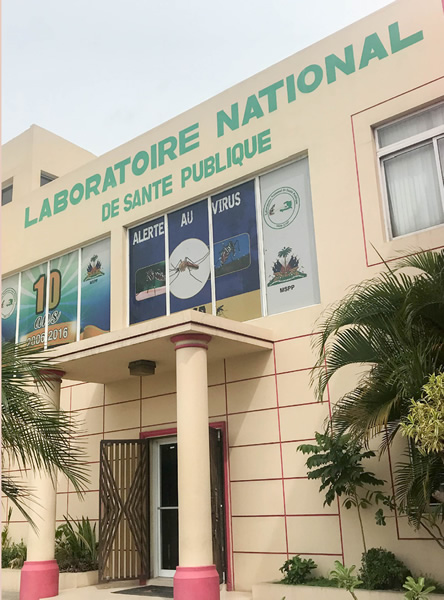 THE MASS GENERAL Center for Global Health (CGH) played a key role in the dissemination of MGH’s COVID ELISA (enzyme-linked immunosorbent assay) antibody test to support the urgent need for accurate testing and disease surveillance in Haiti and Bangladesh.
THE MASS GENERAL Center for Global Health (CGH) played a key role in the dissemination of MGH’s COVID ELISA (enzyme-linked immunosorbent assay) antibody test to support the urgent need for accurate testing and disease surveillance in Haiti and Bangladesh.
Once Mass General had its ELISA test developed in March, Jason Harris, MD, MPH, Chief of Pediatric Global Health at Mass General Hospital for children, CGH Executive Director Louise Ivers, MD, MPH, DTM&H, and Richelle Charles, MD, FIDSA, Principal Investigator in the MGH Division of Infectious Diseases and CGH Associate in Global Health, in concert with other MGH staff, quickly joined forces with international colleagues at the Haitian National Laboratory, the Haiti CDC, Bangladesh’s Institute of Epidemiology Disease Control and Research (iedcr), and the International Center for Diarrhoeal Disease Research, Bangladesh (icddr,b) regarding sharing antibody testing procedures and reagents.
The MGH ELISA antibody test study is currently in peer review, but findings indicate the test is highly accurate with 100 percent specificity (no false positives out of more than 1,500 negative samples tested) and 97 percent sensitivity when administered over 14 days after symptoms were experienced.
“It’s hard to intervene and be aware of how COVID is spreading unless you know who’s at greatest risk—and you can’t determine that accurately without testing,” said Dr. Harris.
Scientists in Haiti and Bangladesh are eager to increase testing in order to characterize the virus and pinpoint hot spots, which will help them mitigate the spread of COVID-19 in those areas.
“We are still deciding in Bangladesh on the use of antibody tests for diagnosis…However, the transfer of technology from MGH very quickly after the pandemic started gave us the capacity to study immune responses. This was the only antibody test available in Bangladesh, and we could quickly carry out studies on COVID-19,” said Dr. Firdausi Qadri, MD, Director of the Center for Vaccine Sciences (CVS), icddr,b.
Dr. Harris is hopeful the test will be utilized in Haiti soon, where the CDC and Haitian National Lab also plan to use testing to comprehensively map the spread of COVID-19 across the country.
“The partnership with Mass General Center for Global Health will help us to advance our public health goals related to COVID-19,” Stanley Juin, MD, CDC Haiti Surveillance Chief said.
In both locations, testing capacity challenges have been compounded by staff and equipment shortages, lab closures and regional factors that put their populations at potentially higher risk for viral transmission, including high population density in major cities like Dhaka and Port-au-Prince.
Dr. Harris (whose connection to treating and studying infectious diseases in Bangladesh dates back to 2001) cited Mass General’s strong global network as key to the successful testing collaborations. Dr. Qadri echoed this sentiment: “We have been working together on different projects of cholera, ETEC and typhoid over the last 25 years based on funding from NIH and from Fogarty training grants. Based on this, we have a close relationship…and both our teams were well prepared with techniques and experience in studies on immune responses on infectious disease.”
While information, such as testing protocols, could be shared virtually, shipping testing materials and reagents to each country required added ingenuity due to international flight restrictions. For example, sending materials to Bangladesh ultimately required trucking the supplies from Boston to Chicago, then repacking them in dry ice to ensure the shipment would remain frozen until it could reach Dhaka and pass through customs five days later.
Damien Slater, PhD, manager of the Harris-LaRocque Lab in Infectious Diseases, was instrumental in the sourcing and preparation of testing supplies, tailoring testing protocols to suit the equipment available in each region, and arranging the delivery of testing materials. “Collective flexibility, persistence and good communication were key in seeing this through,” Slater said.
Going forward, Dr. Qadri reports the antibody measurements will be used in Bangladesh to study herd immunity as well as to study vaccine responses in upcoming trials.
Although COVID-19 has disproportionately impacted many low-resourced countries, broad international funding and support in those regions has been noticeably lacking. Dr. Harris said this fact underscores the significance of sustained global health collaborations: “It’s important to not neglect our international partners, even when we’re facing our own problems at home.”

